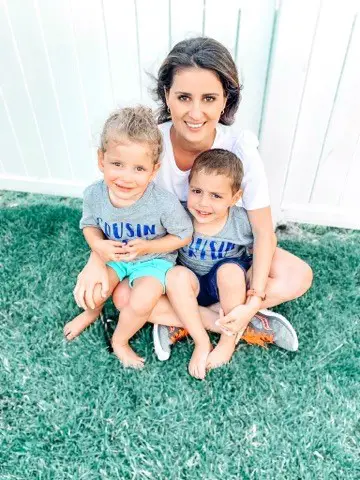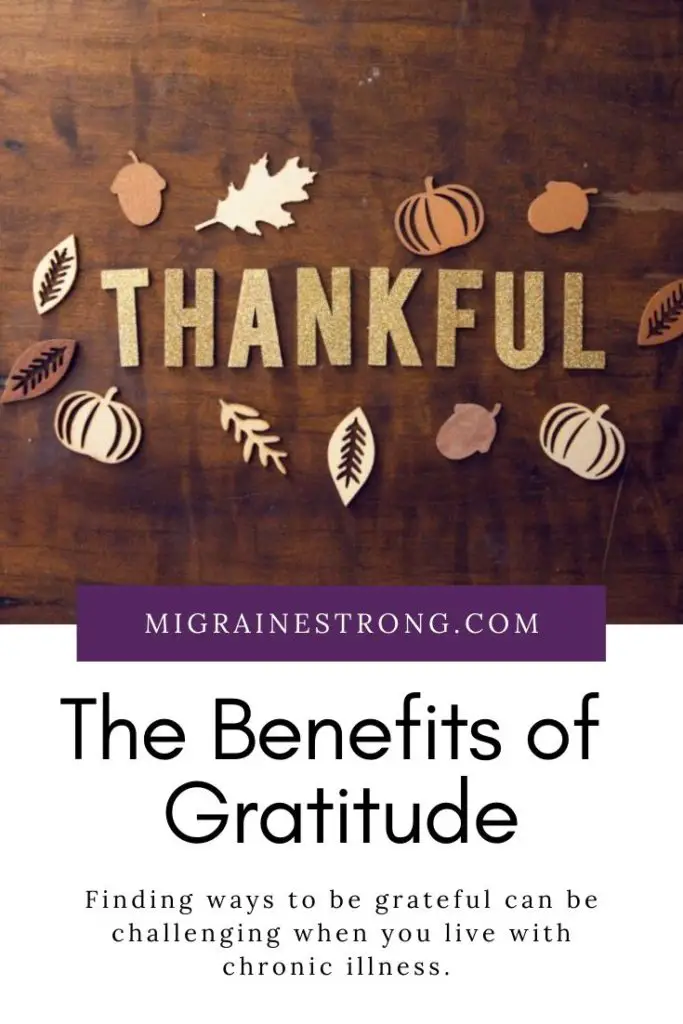The benefits of practicing gratitude are almost too many to count. During this season of thanksgiving, we tend to talk about the things we are grateful about for a day or two. But it’s rare that we break down how practicing gratitude can have long lasting effects on our emotional, physical and social well being. We thought it would be interesting to look at the effects of gratitude on each of these levels and then how we are practicing gratitude in our own lives.
** While Migraine Strong writes about the latest in migraine treatments, this is not medical advice. We are patient educators and all information you read should be discussed with your doctor.
Emotionally Uplifting
Not surprisingly, practicing gratitude can positively affect our everyday thoughts. While the initial practice of writing in a gratitude journal can give us a brief moment of good feelings, we don’t feel the lasting effects of it right away. However with daily or weekly practice of focusing on things or people that we feel grateful for, studies show that our brains will change and we will start to approach life with more positive feelings. ‘A simple gratitude writing intervention was associated with significantly greater and lasting neural sensitivity to gratitude’ measuring up to three months later. (Kini et al, 2015) This occurred even without conscious thought on our part. All because of practicing gratitude.
This enhanced mood is due to a boost in serotonin and dopamine which is exactly what we get from anti depressant medications. Practicing gratitude helps to block negative emotions so that we are less prone to anger, stress, worry and depression. It helps us to be more self aware and have more positive thoughts in general.
Physically Rebuilding
We can also benefit from practicing gratitude by becoming physically healthier. Intentionally practicing ‘gratitude was associated with better sleep, less depressed mood, less fatigue, and better self-efficacy to maintain cardiac function. Patients expressing more gratitude also had lower levels of inflammatory biomarkers’ (Mills et al., 2015). Practicing gratitude can help release endorphins into the bloodstream which helps us cope with stress and pain better. The endorphins help to relax our heart and strengthen our immune system. All of those things can benefit the average person, but it is an amazing benefit to anyone who has a chronic illness like migraine.
Socially Inspiring
By practicing gratitude regularly, our brain neurons begin to rewire, firing into more positive automatic patterns. The more we practice, the more our brains begin to look for things to feel grateful for and the less effort it takes. We also learn better communication to use with our friends and family. ‘Practicing gratitude improves interpersonal relationships, increases feelings of social inclusion and closeness, and predicts reciprocal prosocial behavior’ (Henning et al, 2017). Our interpersonal skills naturally improve and we also develop stronger empathy. This empathy helps us to establish better team related skills and more likability. Becoming more aware of what drives gratitude for others helps us to become better at engaging in meaningful social relationships.
How To Practice Gratitude
An effective way to get into a habit of practicing gratitude is to start a “Gratitude Journal.” The idea is to create a list of 5-10 things for which you feel grateful. You will find that the more you journal the easier it becomes and you will start intentionally looking for things to be grateful for. It might be difficult to come up with ideas, at first, especially if you are going through challenging times. But this is also when gratitude is most important to practice. Your list can be as simple or as creative as you wish! Try using colorful gel pens to make the process more fun. You can write it daily or weekly. When you make a list, take a moment to review it and really feel the gratitude for the items you’ve listed.

You can feel grateful for anything! Here are some examples of what to focus on if you feel stuck:
- Your arms/hands and the ability to hug and hold loved ones and prepare food
- Your legs which allow you to run, swim, and climb
- Any parts of your body that are healthy and work well
- Enjoyable meal
- A pet
- A visit, a talk or just a laugh with a friend
- Not getting stuck in traffic on the drive home from work
- Upcoming vacation
- Being excited about weekend plans
- A family member
- Home
- Job
- Someone’s act of kindness
- A skill you possess
- Fresh food
- Beauty of trees/nature
- Electricity
And remember that the more you journal, the easier it will become and the more you will intentionally look for things to be grateful for.

Eileen Reflects on Gratitude
Recently, I was chatting with one of my online migraine buddies about my years of chronic/intractable migraine. She asked me how I had managed to deal with those many years of prolonged pain without any sign of relief. I talked to her a little bit about not getting caught up in the question of ‘why’. Why me? Why isn’t there an answer? Etc etc. There are no answers to the ‘why’ questions and a lot of times that just takes us down a rabbit hole of anger and depression. There are no steps forward with that question, so I avoid it whenever possible. Especially if I know there is definitely no answer.
Support Freely Given
However, the more I thought about the answer to the question I realized that a larger part of the answer was in the gratitude I felt for those that had supported me through that time. My husband, children, parents, siblings, in-laws, friends and doctors…they all supported me and lifted me up in massive and little ways all the time. Whether it was watching our kids, making dinners, bringing me ice packs, neck rubs, adjusting ingredients for meals they were making or being understanding when I was just down for the count. I had an amazing group of people around me, each supporting me in their own way and I will never forget the support that was freely given to me in my darkest time.
I have thanked God nightly for all of these people who have touched my life in one way or another. Practicing gratitude can take many forms. Prayer, journaling, including acts of kindness in your day, volunteering your time in any way you can or telling those around you how much you appreciate them. All of these will have a lasting, positive effect on you and your health.

Jennifer’s Reflections on Gratitude
When you’re suffering from daily symptoms of vestibular migraine there is no question that life is hard. Ear ringing is like a little voice constantly pestering you and daily dizziness makes even simple tasks difficult. It’s exhausting, wears on you and chips away at your happiness every day that it’s happening. In our lowest moments we may feel deep sadness and even anger over how our lives have changed.
One of the most important lessons I’ve learned as a result of my chronic vestibular migraine diagnosis is that having an attitude of gratitude was literally like someone throwing me a life raft as I was drowning. Being intentional about recognizing and appreciating the many things that were going right all around me began to spin a tiny thread of hope. And the more positive experiences and goodness I focused on, the thicker that thread grew until I created a strong rope that acted like a life line keeping me from drowning in that despair.
For me gratitude is not about pretending those negative feelings don’t exist, but choosing to focus on goodness in spite of them. So what’s goodness for you? The joy of nature? When your partner does something for you without asking? When you accomplish something you’ve had your heart set on doing? Feeling warm sunshine on your face? When someone holds a door open for you? If you can, write them down because it will give you something to reflect back on later but, if you’re having trouble with brain fog or bouncy vision and feel like writing is not for you, don’t worry. You can get the benefits of gratitude just by slowing down, taking time to notice and relish in those good things as they happen.

My Gratitude List Is Endless
If I truly named all of the things I’m grateful for in this life my list would go on forever because I’m grateful for so many things on a daily basis. But, to name a few, I’m grateful for easy days when things just seem to go right and I hit all the green lights driving into work and people let me into traffic. Because I spent so many months unable to work I’m grateful to feel good enough to be able to work full time and to help people while i’m there. I’m thankful for small things like feeling good enough to run errands like going to the grocery store without triggering an attack. For the peace nature provides me and for the home Tom and I have built together surrounded in nature and joy.
I can’t close without saying how grateful I am for the endless people in my life, friends and family who make me smile everyday. My cup runneth over with their kindness and support. Lastly, I’m so grateful for my home within Migraine Strong. You all are truly the kindest group of people on the internet. It’s impossible to read your stories and responses in support of one another and not feel moved by your compassion on a daily basis. Wishing you gratitude that lasts long after Thanksgiving.

Danielle’s Reflection on Gratitude
I was really looking forward to writing about gratitude this morning. My mood was great as I measured ingredients in preparation for making my daughter’s birthday cupcakes with her later. It’s best to measure the flour when she isn’t around! I sat in a comfy chair with my decaf ready to write about gratitude and instantly started bawling. Not just filling up with tears – bawling. That was a few minutes ago and I feel much better again. So, don’t be surprised if thinking about what you have to be thankful for brings up some unexpected and strong emotions.
2018 and 2019 have had some profoundly rough times for me and my entire family. While some of the people I love most became healthier, my mother was diagnosed with lung cancer and we all weathered the effects of a divorce in our loving inner circle. We decided to move from Pennsylvania to Florida, close 2 businesses and sell properties. In great part, we moved to Florida to be near my parents. My mother died 3 weeks after we arrived in our new home. It has been a very stressful and hectic year. We are currently going through our “year of firsts” without our matriarch. With that said, I have a very long list of things to be grateful for. I’ll just share a few of the things that come immediately to my mind.
What Family Brings to Us
First, my husband is amazing in so many ways. He knows when I’m not feeling like myself and does all he can to see that I get what I need. My almost-11 year old daughter is the sunshine of my life and I am grateful for how she boosts my mood when I hear her sing in the shower each day. I’m grateful that she is an avid sailor and has given our family this new hobby/lifestyle that allows us to be surrounded by nature-loving people. I am thankful for our new, beautiful home in Florida where the weather allows us to be active and outside almost each day. I’m grateful that I had an incredible mother for 54 ½ years and I still have my 80 year old, loving father with us.
Gifts From Migraine
Regarding some “gifts” from migraine, it gave me the honor of having you read this. Thank YOU. I went into the field of healthcare as I wanted to help people feel better. The friends I have made through Migraine Strong have been a tremendous part of my life. I get to learn and grow with like-minded people. Reaching out and help other people trying to feel better and lead their best lives in spite of having cranky, uncooperative neurons helps my own well-being.
Some things that I am grateful for because they make dealing with migraine so much easier – my Bucky eyemask, Audible, binge-worthy shows on streaming services, HGTV, The Food Network, Sumatriptan, jigsaw puzzles and Migrasoothe. I’m grateful to Jennifer for introducing me to “raising” butterflies as this hobby is therapeutic for me in many ways and I’m grateful for doctors, science and technology that help my pain go away. I’m grateful that my neck has gotten better over time instead of worse and that I can exercise each day and I’m incredibly thankful for how the internet has informed and empowered us so we may all figure out how to take control of our well-being and get better.
Marina’s Reflection on Gratitude
Holidays can be a very difficult time for everyone, with the stress, obligations, and high expectations looming over us. They can especially be difficult for those of us with chronic illness. Holiday season may underline to us how we are in pain while the rest of the world is celebrating. It can even magnify how much we cannot do while the rest of the world appears to be doing it all. Gratitude can help with those feelings.
Three years ago around this time of the year, my chronic migraine was out of control. I had two babies and was home bound. I required family members to come stay with me to help me get through the days and was in constant pain. The weakness was so severe I could barely walk down the hall. I was vomiting every day and I felt hopeless and alone. The world was at its happiest, but I was at the lowest point in my life, and I did not know how to handle it.
I did not know how to feel grateful while living in constant pain and I did not know then that I wasn’t alone. I did not know there was an entire community of people fighting migraine. It was not until many months later that I found Migraine Strong Facebook group and learned about the benefits of positive thinking and gratitude, the treatment pie, and the rebound headaches. I am so grateful that I did.
Family Is Everything
I have made such strides in the past 3 years. Using the techniques that Migraine Strong teaches, I have learned to take control of migraine. I am grateful for my supportive husband who has done everything to help me get better. Aside from laundry, there’s no chore he does not do! Shopping, cleaning, cooking, you name it!
I am grateful for my amazing children. I am grateful that I have been able to shop for their Christmas presents for the past month. (You see, 3 years ago, my kids did not have any presents under our tree).

I am grateful that I am able to work. (When I was experiencing daily pain I had to stop working for a year.)
I am grateful for my sister and parents who were there for me during my health crisis. Even though they live hundreds of miles away, they came to stay with me whenever they could to help. Their help and support got me through the darkest time of my life.
I am also grateful for the women of the Migraine Strong team. We are all so different and yet we have been working together towards the same goal: to help people take control of migraine and find relief.
Finally, I am grateful that i learned to practice gratitude despite my chronic illness. It taught me that I can still be positive and feel gratitude while living with this painful condition. Gratitude became one of the important tools in my migraine management.
Alicia’s Reflection on Gratitude
I’ll be the first to admit that practicing gratitude when it feels like the world is against you is really tough. It was actually Thanksgiving three years ago that I had just been forced to quit my career because of chronic vestibular migraine. I felt totally hopeless and worthless. But as I found a neurologist who really understood VM and started spending my free time working on The Dizzy Cook, I began to heal and that void of hopelessness started to fill.
This year has been one of my hardest since being diagnosed with vestibular migraine. Last Christmas we lost our first child after trying for a year. Then this year, I had two more losses. The last one hit hard because it was our first time trying with the help of a reproductive endocrinologist. Even after countless tests, bloodwork, and lots of medications that wrecked my head and made me insane I still can’t seem to carry a baby. It doesn’t help that literally all my best friends are pregnant right now, and I feel totally alone in this journey. Every day I hear of someone just breathing and they get pregnant. Again I wonder, why me? What did I do to deserve to go through an expensive medical journey again?
Finding Gratitude Amidst Pain
After we found out I was losing our 3rd baby I looked at my husband and I said I need to get out of here. So that day we went online and used all our airline miles to book a trip to England for Christmas. I can’t tell you how wonderful it is to have something to look forward to like that. I try to focus on doing the things I couldn’t do if I were pregnant – like getting beers at the pub (with Wands, of course) or riding all the rides at Disney World. Everyone worries about what their migraine disorder will be like when they give birth, and I was one of them, until I realized what a blessing that is to even have to worry about.
Sometimes it’s literally painful for me to be thankful for what I currently have, but in the end it does bring peace. It’s a reminder that sometimes things have a way of working out, even though everything seems hopeless in the current state. I think about where I was when I started The Dizzy Cook and now about my cookbook, which I just found for pre-order on Target the other day. How amazing that something so terrible can be turned into something for good! I’m so grateful for the kind people who I’ve only ever met online through VEDA and Migraine Strong that check in on me all the time. I’m blessed to have a family who has supported us along the way. Oh, and I’m also thankful for pumpkin cheesecake which seems to make any bad day a lot better.
If you would like to discuss gratitude with us, please join us in our Private Facebook Group. We would love to hear about how gratitude is shaping your life.
References:
Kini, Prathik., Wong, Joel., McInnis, Sydney., Gabana, Nicole., Brown, Joshua W. et al. (2015) The effects of gratitude expression on neural activity. NeuroImage. 128, 1-10 doi: 10.1016/j.neuroimage.2015.12.040
Mills, P. J., Redwine, L., Wilson, K., Pung, M. A., Chinh, K., Greenberg, B. H., et al. (2015). The role of gratitude in spiritual well-being in asymptomatic heart failure patients. Spirituality Clin. Pract. 2, 5. doi: 10.1037/scp0000050
Henning, M., Fox, Glenn R., Kaplan, Jonas., Damasio, Hanna., Damasio, Antonio et al. (2017). A potential role for mu-opioids in mediating the positive effects of gratitude. Frontiers in Psychology. 8, 868 doi: 10.3389/fpsyg.2017.00868

